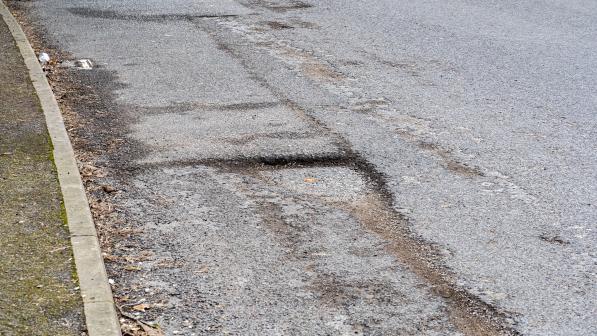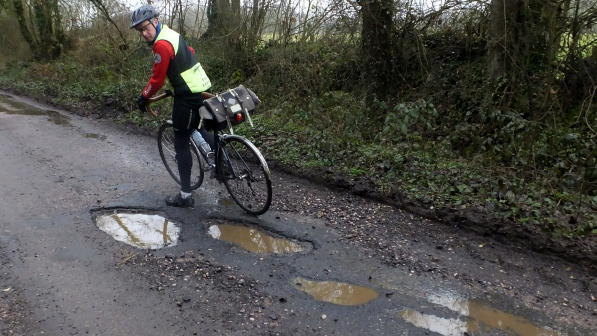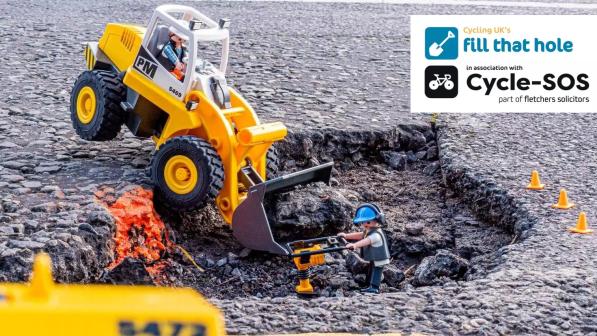Pothole Watch: Roads investment should value local journeys

Today, newly published research from Cycling UK has revealed the sorry state of funding for local authorities when it comes to fixing our pothole crisis – with most councils across Great Britain seeing less money available compared to 2016/7.
We all know that the pandemic has sorely affected local and central government budgets, but we also know that despite this, in England at least, the Westminster Government is pushing ahead with its £27.4bn investment in a small number of motorways and A-roads, despite an ongoing legal challenge by the Transport Action Network.
Report potholes on Fill That Hole
The current one-time catch-up cost to repair our roads in England, as estimated by the Asphalt Industry Alliance, is less than half of that – at around £10.4bn. It’s up from £8.99bn in 2019/20, but a look over the past five years shows it continuously hovering around the £10bn mark – evidence that despite repeated government announcements of pothole funds and allocations (which often represent the same money being announced again and again), we’re no closer to tackling the root of the problem; we’re bailing out the boat without repairing the gaping hole in the hull.
For many local authorities, the picture is much worse, and that boat is slowly but steadily sinking. When inflation is taken into account, 58% of councils have less money than they did five years ago for pothole repairs, and that can only mean a worsening situation. Although local roads are councils’ responsibility, the increasing pressure on local government budgets – even before the pandemic – is well documented, and without a serious upfront commitment from central governments across the UK, it’s unrealistic to expect local authorities to find the cash to keep roads in a good state of repair themselves.
But does this really matter in the wake of a global pandemic?
I think it does. Of course, it’s not number one on the list of the UK’s crises, nor is it even in the top ten. But when we boil it down to a focus on transport, and roads specifically, and we contrast it with the vast investment being made in the major roads network – which is used for a fraction of journeys – questions must be asked as to whether at least some of this money wouldn’t be better spent enabling people to travel locally. Local journeys represent 68% of all trips in the UK, and potholes aren’t just a nuisance, they can be a particularly serious safety issue for people cycling.
Motorways or local roads?
It’s not that all investment in new or improved roads is automatically “bad”, or that every A-road upgrade should be abandoned, but simply that investment in our roads should be planned in a way that matches with our governments’ purported transport objectives: to get significantly more people cycling and walking. Of course, that should mean more investment in networks of cycle lanes and other cycling infrastructure, but it should also mean serious investment to bringing our local roads up to a reasonable standard.
Where protected cycle lanes don’t exist (and that’s most of the country), it’s the quieter backroads and country lanes that provide the quiet and pleasant routes for cycling around towns and in the countryside, yet these are often the roads in the worst state of repair.
Instead of tackling this problem, the Government is pouring billions into expanding motorways and A-roads, a practice which is well established to encourage more people to choose to drive, and generally presents only a short-term solution to congestion. With more people likely to be working from home regularly into the future, now is the time to shift roads spending towards the local roads we all use every day when we’re walking, cycling or indeed driving. Part of that shift should involve serious spending to tackle the root of the pothole problem.
Is it still worth reporting potholes?
But with so many local authority budgets falling, what does this mean for reporting potholes on Fill That Hole? Taking the time to report potholes – especially those which are dangerous for cycling – is as important as ever. Until a pothole is reported, your local authority may not even know it’s there, and that’s one way to guarantee it certainly won’t be fixed.
It’s true, reporting alone won’t suddenly spur your council into repairing every local road, but it will help them identify and fix dangerous potholes, and that really does matter, especially given the spring may well bring another boost in novice cycling as we saw last year.
So, while lockdown continues, why not take the time when you’re next out for exercise or an essential journey, and use Fill That Hole to get those potholes fixed.





